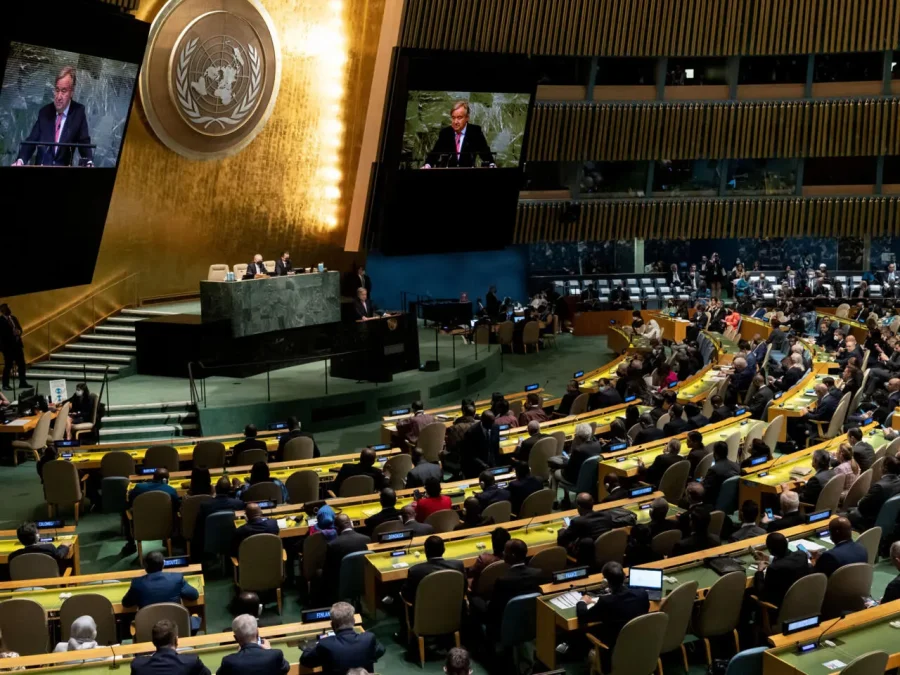The UN General Assembly meets Wednesday, two days ahead of the anniversary of Russia’s invasion of Ukraine, with Kyiv and its allies hoping to garner broad support for a resolution calling for a “just and lasting peace.”
The draft resolution, sponsored by some 60 countries, is to be voted on after the close of debate — not expected until at least Thursday.
The text “underscores the need to reach, as soon as possible, a comprehensive, just and lasting peace in Ukraine in line with the principles of the Charter of the United Nations.”
Like previous resolutions, it reaffirms the UN’s “commitment to the sovereignty, independence, unity and territorial integrity of Ukraine” and calls for an immediate cessation of hostilities.
The text, which unlike a Security Council reso-lution would not create a binding law, demands Russia “immediately, completely and unconditionally withdraw all of its military forces from the territory of Ukraine.”
Kyiv hopes to garner the support of at least as many nations as in October, when 143 countries voted for a resolution condemning the annexation of several Ukrainian territories by Russia.
To that end, Ukraine stopped pushing for the immediate inclusion of President Volodymyr Zelen-sky’s 10-point peace plan which he presented in November, according to diplomatic sources.
“I think we have come up with a text which really tries to gather the international community, tries to be as cohesive and as positive as possible,” said one European diplomat.
A year after the invasion of Ukraine, it will also be a message to Russia that “it cannot achieve its objectives through force”, the diplomat added, hoping that if Moscow “feels isolated, at a certain point the pressure will be too strong to be resisted.” The days-long debate on the resolution, which will feature a host of ministers visiting New York, including US Secretary of State Antony Blinken, is set to begin Wednesday at 3:00 pm local time (2000 GMT).
On Tuesday, Russian President Vladimir Putin vowed to “systematically” continue his offensive in Ukraine, in an anti-Western speech reminiscent of the Cold War.
As some countries in the global South express weariness that the North is overly focused on the conflict, US ambassador Linda Thomas-Greenfield argued that supporting peace in Ukraine “is not somehow about choosing between the United States and Russia,” but “defending the charter” of the UN.
China is also growing worried that the conflict may spiral out of control, and has indicated that it wants to present a proposal soon to find a “political solution” to the war.
China and others, notably India, have abstained during the series of UN votes on Ukraine.
“If Kyiv won’t talk about peace, there is a risk that the BRICS countries will start to say Ukraine is the real obstacle to peace,” said International Crisis Group analyst Richard Gowan, referring to Brazil, India, China and South Africa.
“That is why the US and EU were keen to get references to a cessation of hostilities in this week’s text,” he told AFP.
That “cessation of hostiles” is accompanied by a stipulation that Russia withdraw its troops, since a simple ceasefire could be just a lull allowing Russia to regroup, diplomats noted.
If the resolution is mainly “symbolic,” Gowan said, it will have the merit of underlining Russia’s isolation, and “undermines Putin’s pretensions to be leading some grand anti-Western coalition.”
The General Assembly has voted on three reso-lutions voicing opposition to the Russian invasion over the past year, with each receiving between 140 and 143 votes in favor.
Five countries have systematically voting against — Russia, Belarus, Syria, North Korea and Eritrea, with fewer than 40 abstaining.
A fourth resolution in April sought to suspend Russia from the UN Human Rights Council, and while successful, it received less support. Only 93 votes were in favour, 24 against and 58 abstentions.—AFP









